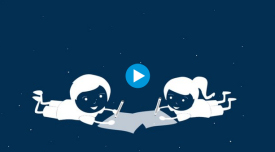Send your drawing into space with CHEOPS
6 May 2015
Do you want to send your art into space on the new CHEOPS satellite? ESA and its mission partners are inviting children to submit drawings that will be miniaturised and engraved on two plaques that will be put on the satellite.
 |
|
How to participate in the competition. Click to access the video. |
CHEOPS – for CHaracterising ExOPlanets Satellite – is a space telescope that will observe nearby stars known to host planets, and is being built as a collaboration between ESA's Science Programme and Switzerland. The planned launch date is at the end of 2017.
With the data from CHEOPS, astronomers will be able to characterise the sizes and masses of many extrasolar planets, to gain new insights into the formation of planetary systems.
Children between the ages of 8 and 14 from any ESA member state or cooperating state can be part of this otherworldly enterprise by creating a drawing inspired by the mission.
While it would be great to collect colourful drawings, the artworks can only be in black-and-white, created with a black pencil or felt-tip pen. This is necessary to ensure that the engraving process accurately captures the drawings as they are transferred to the metal plaques.
Up to 3000 drawings will be shrunk down by a factor of about 1000 and engraved on the metal plaques that will fly into space on CHEOPS. If more than 3000 entries are received, ESA and its partners will organise a lottery to select the drawings for engraving.
To take part in this competition, you will need to download and print out a standard template provided here, make your drawing on it, and complete your contact details. Then send it via letter to either your local CHEOPS mission partner institution, if there is one in your home country, or to ESA directly.
Entries will be accepted until 31 October 2015, and the postmark will be considered proof of the date of posting.
This competition is an initiative of the University of Bern, Switzerland, the overall coordinator of the activity. Mission partner institutions in the countries that are part of the CHEOPS consortium (Austria, Belgium, France, Germany, Hungary, Italy, Portugal, Spain, Sweden, Switzerland and the UK) are also open for entries, as is ESA directly, representing all of its member states.
Full rules, terms, and conditions can be found here.
The standard template for the drawings can be found here.
Contacts and mail addresses for the national competitions here.
Feedback questionnaire about the competition (optional) here.
Posters to advertise the competition can be downloaded here.
Notes for editors
CHEOPS is an ESA mission in partnership with Switzerland, through the Swiss Space Office. The University of Bern leads a consortium of 11 ESA Member States contributing to the mission and represented in the CHEOPS Science Team.
ESA is the mission architect responsible for overall mission definition and procurement of the spacecraft and launch. ESA is also responsible for the early operations phase, which will be executed by the spacecraft contractor. The science instrument is led by the University of Bern, with important contributions from Austria, Belgium, Germany and Italy. Other contributions to the science instrument in the form of hardware or science operations are provided by Hungary and by France, Portugal, Sweden and the UK, respectively. Following in-orbit commissioning of the spacecraft, responsibility for operations will be taken over by the CHEOPS Mission Consortium, with the Mission Operations Centre under the responsibility of Spain and the Science Operations Centre led by and located at the University of Geneva, Switzerland.
Contacts
Markus Bauer
ESA Science and Robotic Exploration Communication Officer
Tel: +31 71 565 6799
Mob: +31 61 594 3 954
Email: Markus.Bauer![]() esa.int
esa.int
Kate Isaak
ESA CHEOPS Project Scientist
Scientific Support Office
Directorate of Science & Robotic Exploration
Tel: +31 71 565 3559
Email: kate.isaak![]() esa.int
esa.int
